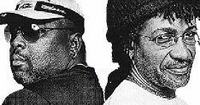Student learns music business
Published: Sunday | September 20, 2009

Rory got some of his early mentoring from Sly (right) and Robbie. - Contributed
Orville 'Rory' Baker was on the path to administration of the nine-to-five variety when he got involved in the music business - where he considers about nine hours a short day and can go up to 18 hours at a stretch. And he has not had a short day in a very long time.
Still, Rory tells The Sunday Gleaner, "it's strictly a hobby, not a profession. I still don't find my profession at this age. I think I want to go into A&R."
The 'hobby' started 14 years ago when Rory tagged along with Handel Tucker and Honey Boy Martin to Mixing Lab studio "and fell in love with it".
"Handel Tucker brought me to see the vibes. I was not in the music business, too tough," Rory said. He liked it, then Martin introduced him to Sly and Robbie "and the rest is history".
Rory learnt studio engineering from Lynford 'Fatta' Marshall, Colin 'Bulby' Yorke, Stephen Stanley, Jason Sterling and Junior Edwards, becoming a recording engineer in a very short time. He first learnt about equipment, then patching and moved on to mixing, which is mostly what he does now.
room to practise
"Mixing Lab gave you the room to practise," he said, with Robert Livingston and Sly and Robbie among those who ran sessions there consistently. He laughs as he tells The Sunday Gleaner that it took a while for him to get paid, "but when me get pay me was well rewarded". It did not hurt that since he was still a student during his apprenticeship period he was still getting some of "Mummy money".
At One Pop, Rory's business administration skills come into play as he not only takes care of how the music sounds but effectively runs the business. So when Jimmy Riley sings "Rory at the control tower" in Pull Up Selector, the combination with his son Tarrus, it can be taken in more ways than one.
The Sunday Gleaner has heard about and read horror and humorous stories of engineers recording what they think are fantastic sessions and then pressing play to listen back and hearing the dreaded sound of silence. There are also tales of engineers recording over or wiping out superb recordings.
good fortune
Rory says he has never made one of those mistakes and puts it down to sheer good fortune. "People say I'm good, but me very lucky," he said.
Among his favourite songs that he has worked on are Foundation (Beenie Man), Impossible Train (Innocent Kru), Hey Baby and Underneath It All (No Doubt), Dancehall Queen (Beenie Man and Chevelle Franklyn), Every Kind of People (Chakademus and Pliers), Fed up (Bounty Killer), Milk and Honey (Al Campbell and Luciano) and El Cumbanchero (Sly and Robbie).
He says the most critical part of the recording process is the vocals, as most Jamaican singers do not know about singing in a particular key, what is sharp and what is flat. "As an engineer, you end up being a co-producer for most people thing," he said. "If a vocalist is not professionally trained it is difficult." He points out that deejays normally stick to F or C, with the songs having no chord progressions.
Rory would like to see Jamaican music come up with something substantial to move forward and to stand up on the international scene. And he would like to see a collective body to secure engineers' rights, including their creative input. "Most don't know their rights. We are overworked and underpaid," Rory said.
- Mel Cooke



















